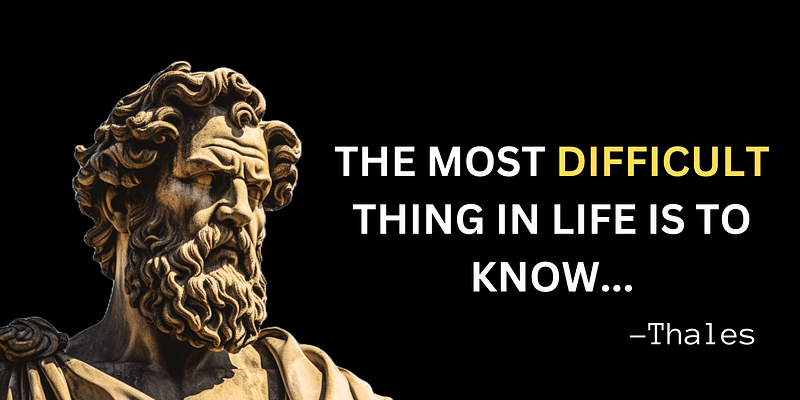
The ancient Greek philosopher Thales of Miletus, one of the Seven Sages of Greece, once profoundly stated, “The most difficult thing in life is to know yourself.” This statement, despite being centuries old, resonates deeply with the human experience, transcending time and cultural barriers. It encapsulates the enduring challenge of self-discovery and self-awareness, a journey that is as relevant today as it was in ancient times.
At its core, Thales’ quote emphasises the intrinsic complexity and ever-evolving nature of the human psyche. Unlike acquiring knowledge about the external world, understanding oneself is a labyrinthine task. It involves peeling back layers of social conditioning, personal experiences, emotions, and beliefs. This journey of self-discovery demands honesty, introspection, and often, the courage to confront uncomfortable truths about oneself.
In the context of Thales’ era, his statement was revolutionary. Greek philosophy often centered around understanding the cosmos, politics, and ethics. Thales, by turning the gaze inward, laid the groundwork for introspective thought, a cornerstone of later philosophical traditions. His emphasis on self-knowledge was not just about understanding one’s character or desires, but about grasping the fundamental nature of one’s existence.
In modern times, Thales’ words find their relevance in numerous fields. Psychology, for instance, delves into understanding the human mind and behavior, echoing Thales’ call for introspection. Self-awareness is recognised as a critical component of emotional intelligence, impacting personal relationships, professional success, and mental health.
Furthermore, Thales’ quote challenges the contemporary culture of external validation and constant connectivity. In a world dominated by social media, where personas are meticulously crafted and presented, his words serve as a reminder to look beyond the facade and explore the depths of our authentic selves.
The pursuit of self-knowledge is not a straightforward path. It is fraught with challenges and often leads to more questions than answers. It requires us to confront our fears, biases, and limitations. However, this journey is also immensely rewarding. It leads to greater self-acceptance, improved relationships, and a deeper understanding of one’s place in the world.
Thales’ statement, “The most difficult thing in life is to know yourself,” is a timeless piece of wisdom. It encapsulates the complex, challenging, yet profoundly rewarding journey of self-discovery. As we navigate the complexities of the modern world, his words remind us of the importance of introspection and the value of understanding our inner selves. This journey, while demanding, is essential for personal growth, fulfillment, and a deeper connection with the world around us.










